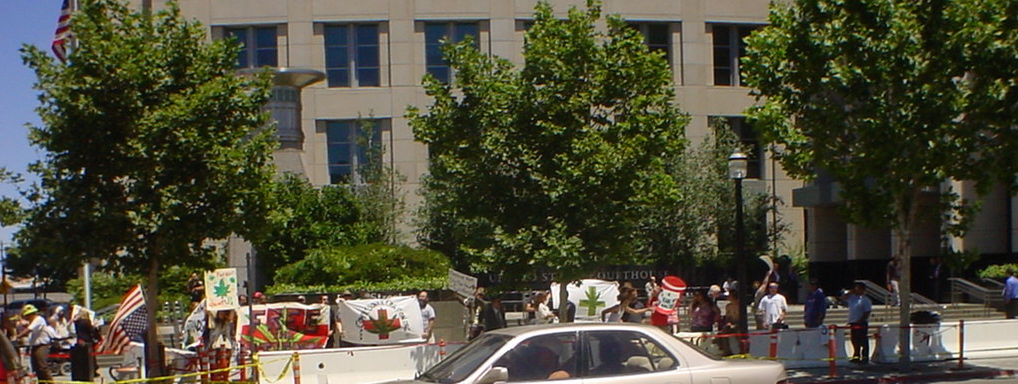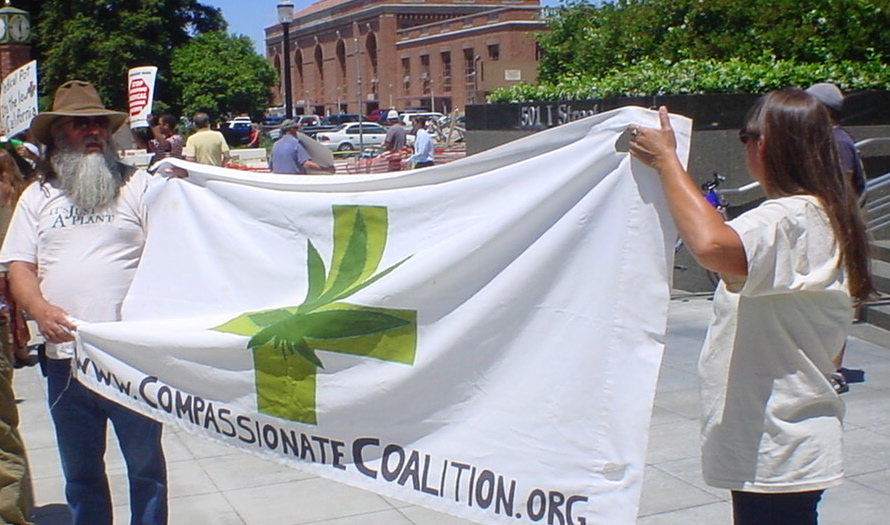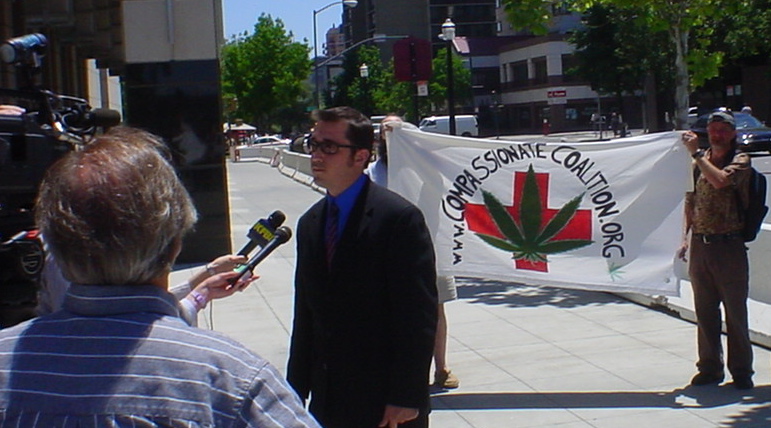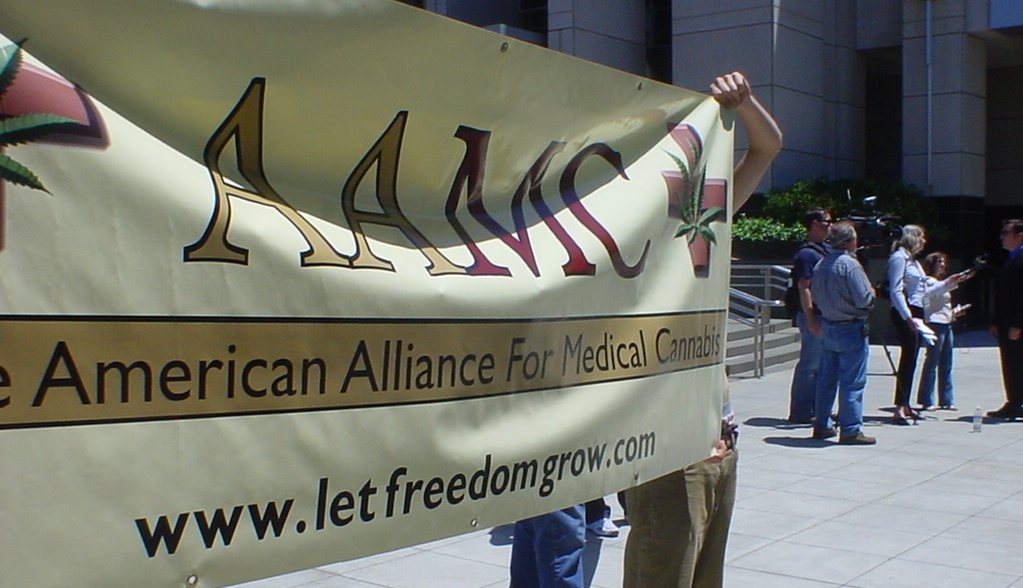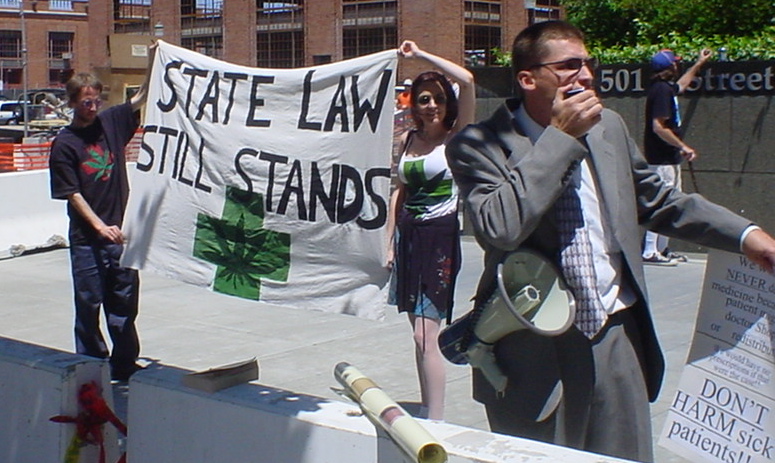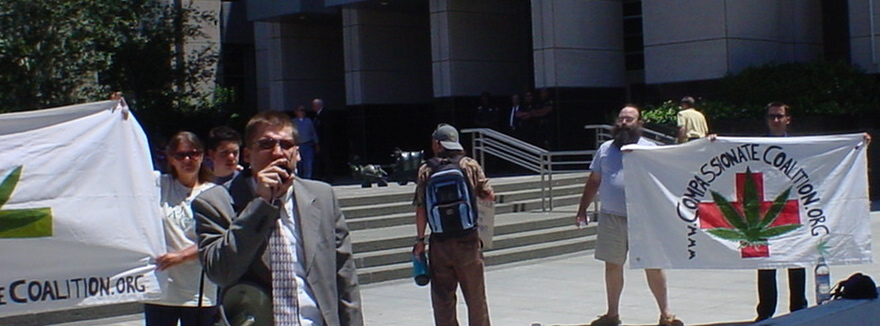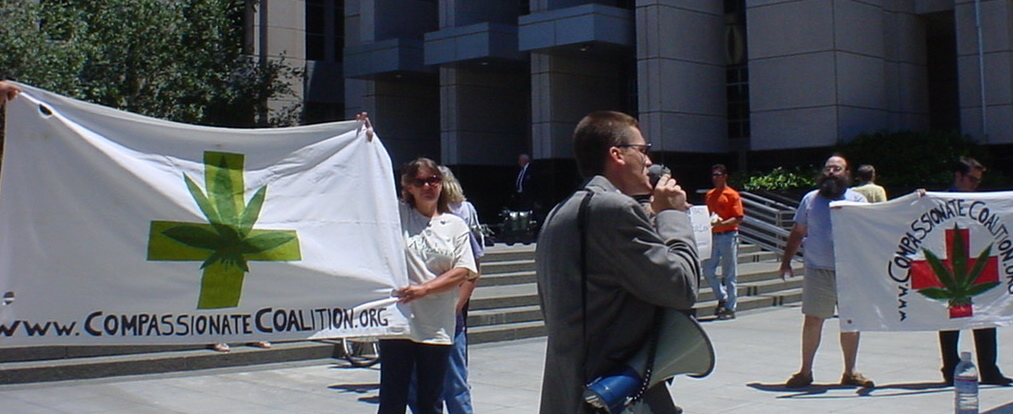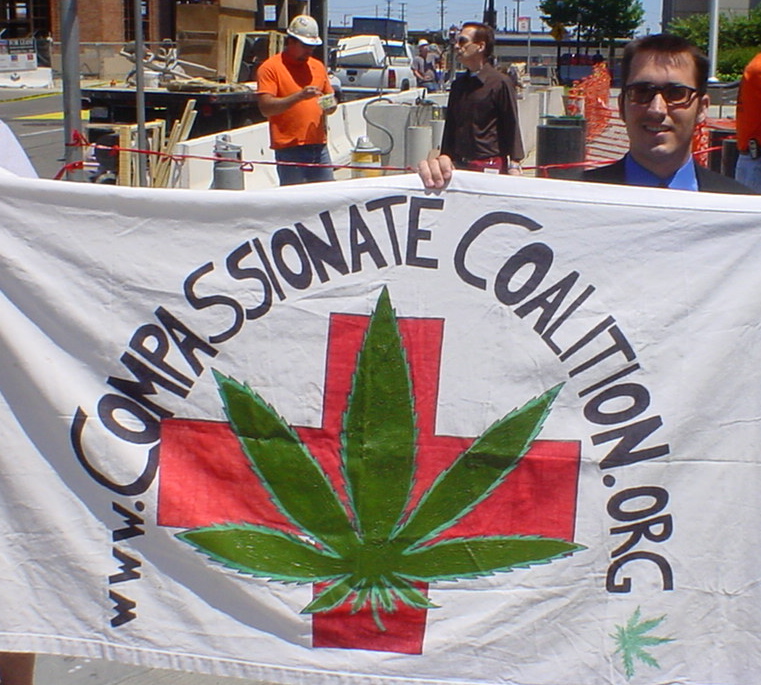From the Open-Publishing Calendar
From the Open-Publishing Newswire
Indybay Feature
Sacramento Medical Marijuana Protest
In response to the Supreme Court decision overturning Raich, medical marijuana patients and advocates gathered in front of the Federal court building in Sacramento to urge congress to pass the Hinchey-Rohrabacher Amendment to the Justice Appropriations bill . 11 pictures, Action items, Example letter, Talking Points and the Syllabus of the decision.

Today, in a 6-3 split decision, the Supreme Court overturned Raich v. Gonzales, ruling that the federal government may continue to arrest and prosecute patients for using medical marijuana according to their state laws. It is important to note that this ruling in no way affects the state laws that legally protect medical marijuana patients.
In their ruling, the Supreme Court acknowledged the preponderance of evidence that marijuana is legitimate medicine. Furthermore, the Court has extended an invitation to Congress to join the 80% of Americans who support medical use of cannabis and reschedule marijuana.
Act now! Urge your Congressional Representative and the Department of Health and Human Services to reschedule marijuana!
1. Call, Fax and Visit Your Congressional Representative. Urge their support of the Hinchey-Rohrabacher Amendment to the Justice Appropriations bill.
Next week Congress will have their first opportunity to act on an invitation extended by 6 Supreme Court Justices to protect medical marijuana patients. Call your U.S. Representative now, urge their support on the Hinchey-Rohrabacher Amendment to the Justice Appropriations bill.
The Hinchey-Rohrabacher medical marijuana amendment would prevents the U.S. Department of Justice -- including the Drug Enforcement Administration -- from wasting taxpayer money to arrest, prosecute or otherwise undermine state medical marijuana laws.
ACTION 1: CALL YOUR U.S. REPRESENTATIVE. Urge their support of the Hinchey-Rohrabacher Amendment to the Justice Appropriations bill. Members of Congress’ offices can be reached through the U.S Capitol Switchboard at (202) 224-3121 or through the online congressional directory at http://clerk.house.gov/members/index.html
ACTION 2: FOLLOW UP WITH A FAX. Please visit http://hinchey.kintera.org to send a free fax or e-mail to your U.S. representative to urging the protection of medical marijuana patients.
ACTION 3: Then, please visit http://www.RaichAction.org to participate in a demonstration outside of your U.S. representative's local district office at noon on Wednesday, June 8.
2. Fax Your U.S. Representative. Urge your congressional representative to sponsor the States’ Rights to Medical Marijuana Act
Now, more than ever, it is crucial Congress take action to reschedule marijuana. A bi-partisan coalition of more than 30 members of Congress has introduced the States’ Rights to Medical Marijuana Act. If passed, this legislation would, among other things, reschedule marijuana from a Schedule I to Schedule II drug according the Controlled Substances Act. Fax your Congressman now and urge support for States' Rights!
Visit http://democracyinaction.org/dia/organizations/asa/campaign.jsp?campaign_KEY=721 to fax your congressional representative.
3. Call or Fax Michael Leavitt. Urge Health and Human Services to reschedule marijuana
In 2001, HHS ruled that marijuana has "No currently accepted medical use in treatment." HHS arrived at this incorrect conclusion by ignoring the overwhelming scientific data recognizing cannabis as a useful treatment.
To ensure safe access for ALL patients, medical marijuana must be removed from Schedule I and it’s medicinal value must be recognized at the federal level.
Call Michael Leavitt, Secretary of HHS to encourage him to support the petition for rescheduling that was submitted in 2002 by the Coalition for Rescheduling Cannabis, an association of public-interest groups and medical cannabis patients that includes Americans for Safe Access.
Contact Info:
Telephone: 202-619-0257
Toll Free: 1-877-696-6775
FAX LETTER:
Dear Secretary Leavitt:
I am sending this letter, to urge your quick and timely response to the Coalition for Rescheduling Cannabis’ petition that was submitted in 2002. Recall, that during your confirmation hearing you promised a response no later than August 2005.
As you are by now aware, the United States Supreme Court, in a split decision ruled that the federal government does in fact have the power to undermine state medical marijuana laws. However, in their majority opinion, the Justices made a special effort to acknowledge the preponderance of evidence regarding the effective medical uses of marijuana.
Additionally, Health Canada recently approved Sativex® (Cannabis sativa L. extract) a new drug developed for the symptomatic relief of neuropathic pain in adults with multiple sclerosis (MS) derived from extracting components of the cannabis plant shown to have therapeutic properties. Its principle active components are THC and CBD, both prohibited under the Controlled Substances Act.
Both the U.S. Supreme Court and the manufactures of Sativex agree that marijuana does have therapeutic value.. However, for medical marijuana to become reality in the United States, rescheduling marijuana is a necessary first step. The Coalition for Rescheduling Cannabis’ Rescheduling petition will remedy this situation.
I am writing to urge you to answer the petition by the August 2005 deadline with no further delay. The health and safety of thousands of patients are depending on your response.
Sincerely;
---------------------------
TALKING POINTS
1) The Supreme Court Decision in Gonzalez v. Raich does NOT affect the medical marijuana voters’ initiatives in any way. Legally, patients are in the exact same place we were in before the Ninth Circuit decision, state law can exist in conflict with federal law. Politically, the Justices have now joined patients, doctors, medical associations, 80% of Americans and policy makers in urging Congress and the FDA to reschedule marijuana.
2) According to the AG of California, state courts can only consider state law when dealing with medical marijuana. That means that our state law does not change and state officials must still uphold the voters’ intent.
3) According to the Supreme Court decision the Federal Government CAN prosecute medical marijuana patients. It does not say they MUST prosecute patients. In fact the Justices question the wisdom in doing so.
4) The DEA busting California’s sick and dying would be like one of our local police departments pulling all their women and men off their assigned duties and make them all focus on jaywalkers. Jaywalking is technically illegal but is it the top priority?
5) We are disappointed with the decision but we are hopeful that Congress and the FDA will follow the Justices’ urging and reschedule medical marijuana.
6) The Justices of our Nation have joined patients, doctors, medical associations, and policy makers in urging Congress and the FDA to reschedule marijuana. This would allow our country to finally have an objective, accurate, science-based conversation about marijuana as medicine and those who need it.
-----------------------------
SYLLABUS
GONZALES V. RAICH (03-1454)
352 F.3d 1222, vacated and remanded.
SUPREME COURT OF THE UNITED STATES
GONZALES, ATTORNEY GENERAL, et al. v. RAICH et al.
CERTIORARI TO THE UNITED STATES COURT OF APPEALS FOR THE NINTH CIRCUIT
No. 03—1454.Argued November 29, 2004–Decided June 6, 2005
California’s Compassionate Use Act authorizes limited marijuana use for medicinal purposes. Respondents Raich and Monson are California residents who both use doctor-recommended marijuana for serious medical conditions. After federal Drug Enforcement Administration (DEA) agents seized and destroyed all six of Monson’s cannabis plants, respondents brought this action seeking injunctive and declaratory relief prohibiting the enforcement of the federal Controlled Substances Act (CSA) to the extent it prevents them from possessing, obtaining, or manufacturing cannabis for their personal medical use. Respondents claim that enforcing the CSA against them would violate the Commerce Clause and other constitutional provisions. The District Court denied respondents’ motion for a preliminary injunction, but the Ninth Circuit reversed, finding that they had demonstrated a strong likelihood of success on the claim that the CSA is an unconstitutional exercise of Congress’ Commerce Clause authority as applied to the intrastate, noncommercial cultivation and possession of cannabis for personal medical purposes as recommended by a patient’s physician pursuant to valid California state law. The court relied heavily on United States v. Lopez, 514 U.S. 549, and United States v. Morrison, 529 U.S. 598, to hold that this separate class of purely local activities was beyond the reach of federal power.
Held: Congress’ Commerce Clause authority includes the power to prohibit the local cultivation and use of marijuana in compliance with California law. Pp. 6—31.
(a) For the purposes of consolidating various drug laws into a comprehensive statute, providing meaningful regulation over legitimate sources of drugs to prevent diversion into illegal channels, and strengthening law enforcement tools against international and interstate drug trafficking, Congress enacted the Comprehensive Drug Abuse Prevention and Control Act of 1970, Title II of which is the CSA. To effectuate the statutory goals, Congress devised a closed regulatory system making it unlawful to manufacture, distribute, dispense, or possess any controlled substance except as authorized by the CSA. 21 U.S.C. § 841(a)(1), 844(a). All controlled substances are classified into five schedules, §812, based on their accepted medical uses, their potential for abuse, and their psychological and physical effects on the body, §§811, 812. Marijuana is classified as a Schedule I substance, §812(c), based on its high potential for abuse, no accepted medical use, and no accepted safety for use in medically supervised treatment, §812(b)(1). This classification renders the manufacture, distribution, or possession of marijuana a criminal offense. §§841(a)(1), 844(a). Pp. 6—11.
(b) Congress’ power to regulate purely local activities that are part of an economic “class of activities” that have a substantial effect on interstate commerce is firmly established. See, e.g., Perez v. United States, 402 U.S. 146, 151. If Congress decides that the “ ‘total incidence’ ” of a practice poses a threat to a national market, it may regulate the entire class. See, e.g., id., at 154—155. Of particular relevance here is Wickard v. Filburn, 317 U.S. 111, 127—128, where, in rejecting the appellee farmer’s contention that Congress’ admitted power to regulate the production of wheat for commerce did not authorize federal regulation of wheat production intended wholly for the appellee’s own consumption, the Court established that Congress can regulate purely intrastate activity that is not itself “commercial,” i.e., not produced for sale, if it concludes that failure to regulate that class of activity would undercut the regulation of the interstate market in that commodity. The similarities between this case and Wickard are striking. In both cases, the regulation is squarely within Congress’ commerce power because production of the commodity meant for home consumption, be it wheat or marijuana, has a substantial effect on supply and demand in the national market for that commodity. In assessing the scope of Congress’ Commerce Clause authority, the Court need not determine whether respondents’ activities, taken in the aggregate, substantially affect interstate commerce in fact, but only whether a “rational basis” exists for so concluding. E.g., Lopez, 514 U.S., at 557. Given the enforcement difficulties that attend distinguishing between marijuana cultivated locally and marijuana grown elsewhere, 21 U.S.C. § 801(5), and concerns about diversion into illicit channels, the Court has no difficulty concluding that Congress had a rational basis for believing that failure to regulate the intrastate manufacture and possession of marijuana would leave a gaping hole in the CSA. Pp. 12—20.
(c) Respondents’ heavy reliance on Lopez and Morrison overlooks the larger context of modern-era Commerce Clause jurisprudence preserved by those cases, while also reading those cases far too broadly. The statutory challenges at issue there were markedly different from the challenge here. Respondents ask the Court to excise individual applications of a concededly valid comprehensive statutory scheme. In contrast, in both Lopez and Morrison, the parties asserted that a particular statute or provision fell outside Congress’ commerce power in its entirety. This distinction is pivotal for the Court has often reiterated that “[w]here the class of activities is regulated and that class is within the reach of federal power, the courts have no power ‘to excise, as trivial, individual instances’ of the class.” Perez, 402 U.S., at 154. Moreover, the Court emphasized that the laws at issue in Lopez and Morrison had nothing to do with “commerce” or any sort of economic enterprise. See Lopez, 514 U.S., at 561; Morrison, 529 U.S., at 610. In contrast, the CSA regulates quintessentially economic activities: the production, distribution, and consumption of commodities for which there is an established, and lucrative, interstate market. Prohibiting the intrastate possession or manufacture of an article of commerce is a rational means of regulating commerce in that product. The Ninth Circuit cast doubt on the CSA’s constitutionality by isolating a distinct class of activities that it held to be beyond the reach of federal power: the intrastate, noncommercial cultivation, possession, and use of marijuana for personal medical purposes on the advice of a physician and in accordance with state law. However, Congress clearly acted rationally in determining that this subdivided class of activities is an essential part of the larger regulatory scheme. The case comes down to the claim that a locally cultivated product that is used domestically rather than sold on the open market is not subject to federal regulation. Given the CSA’s findings and the undisputed magnitude of the commercial market for marijuana, Wickard and its progeny foreclose that claim. Pp. 20—30.
352 F.3d 1222, vacated and remanded.
Stevens, J., delivered the opinion of the Court, in which Kennedy, Souter, Ginsburg, and Breyer, JJ., joined. Scalia, J., filed an opinion concurring in the judgment. O’Connor, J., filed a dissenting opinion, in which Rehnquist, C. J., and Thomas, J., joined as to all but Part III. Thomas, J., filed a dissenting opinion.
In their ruling, the Supreme Court acknowledged the preponderance of evidence that marijuana is legitimate medicine. Furthermore, the Court has extended an invitation to Congress to join the 80% of Americans who support medical use of cannabis and reschedule marijuana.
Act now! Urge your Congressional Representative and the Department of Health and Human Services to reschedule marijuana!
1. Call, Fax and Visit Your Congressional Representative. Urge their support of the Hinchey-Rohrabacher Amendment to the Justice Appropriations bill.
Next week Congress will have their first opportunity to act on an invitation extended by 6 Supreme Court Justices to protect medical marijuana patients. Call your U.S. Representative now, urge their support on the Hinchey-Rohrabacher Amendment to the Justice Appropriations bill.
The Hinchey-Rohrabacher medical marijuana amendment would prevents the U.S. Department of Justice -- including the Drug Enforcement Administration -- from wasting taxpayer money to arrest, prosecute or otherwise undermine state medical marijuana laws.
ACTION 1: CALL YOUR U.S. REPRESENTATIVE. Urge their support of the Hinchey-Rohrabacher Amendment to the Justice Appropriations bill. Members of Congress’ offices can be reached through the U.S Capitol Switchboard at (202) 224-3121 or through the online congressional directory at http://clerk.house.gov/members/index.html
ACTION 2: FOLLOW UP WITH A FAX. Please visit http://hinchey.kintera.org to send a free fax or e-mail to your U.S. representative to urging the protection of medical marijuana patients.
ACTION 3: Then, please visit http://www.RaichAction.org to participate in a demonstration outside of your U.S. representative's local district office at noon on Wednesday, June 8.
2. Fax Your U.S. Representative. Urge your congressional representative to sponsor the States’ Rights to Medical Marijuana Act
Now, more than ever, it is crucial Congress take action to reschedule marijuana. A bi-partisan coalition of more than 30 members of Congress has introduced the States’ Rights to Medical Marijuana Act. If passed, this legislation would, among other things, reschedule marijuana from a Schedule I to Schedule II drug according the Controlled Substances Act. Fax your Congressman now and urge support for States' Rights!
Visit http://democracyinaction.org/dia/organizations/asa/campaign.jsp?campaign_KEY=721 to fax your congressional representative.
3. Call or Fax Michael Leavitt. Urge Health and Human Services to reschedule marijuana
In 2001, HHS ruled that marijuana has "No currently accepted medical use in treatment." HHS arrived at this incorrect conclusion by ignoring the overwhelming scientific data recognizing cannabis as a useful treatment.
To ensure safe access for ALL patients, medical marijuana must be removed from Schedule I and it’s medicinal value must be recognized at the federal level.
Call Michael Leavitt, Secretary of HHS to encourage him to support the petition for rescheduling that was submitted in 2002 by the Coalition for Rescheduling Cannabis, an association of public-interest groups and medical cannabis patients that includes Americans for Safe Access.
Contact Info:
Telephone: 202-619-0257
Toll Free: 1-877-696-6775
FAX LETTER:
Dear Secretary Leavitt:
I am sending this letter, to urge your quick and timely response to the Coalition for Rescheduling Cannabis’ petition that was submitted in 2002. Recall, that during your confirmation hearing you promised a response no later than August 2005.
As you are by now aware, the United States Supreme Court, in a split decision ruled that the federal government does in fact have the power to undermine state medical marijuana laws. However, in their majority opinion, the Justices made a special effort to acknowledge the preponderance of evidence regarding the effective medical uses of marijuana.
Additionally, Health Canada recently approved Sativex® (Cannabis sativa L. extract) a new drug developed for the symptomatic relief of neuropathic pain in adults with multiple sclerosis (MS) derived from extracting components of the cannabis plant shown to have therapeutic properties. Its principle active components are THC and CBD, both prohibited under the Controlled Substances Act.
Both the U.S. Supreme Court and the manufactures of Sativex agree that marijuana does have therapeutic value.. However, for medical marijuana to become reality in the United States, rescheduling marijuana is a necessary first step. The Coalition for Rescheduling Cannabis’ Rescheduling petition will remedy this situation.
I am writing to urge you to answer the petition by the August 2005 deadline with no further delay. The health and safety of thousands of patients are depending on your response.
Sincerely;
---------------------------
TALKING POINTS
1) The Supreme Court Decision in Gonzalez v. Raich does NOT affect the medical marijuana voters’ initiatives in any way. Legally, patients are in the exact same place we were in before the Ninth Circuit decision, state law can exist in conflict with federal law. Politically, the Justices have now joined patients, doctors, medical associations, 80% of Americans and policy makers in urging Congress and the FDA to reschedule marijuana.
2) According to the AG of California, state courts can only consider state law when dealing with medical marijuana. That means that our state law does not change and state officials must still uphold the voters’ intent.
3) According to the Supreme Court decision the Federal Government CAN prosecute medical marijuana patients. It does not say they MUST prosecute patients. In fact the Justices question the wisdom in doing so.
4) The DEA busting California’s sick and dying would be like one of our local police departments pulling all their women and men off their assigned duties and make them all focus on jaywalkers. Jaywalking is technically illegal but is it the top priority?
5) We are disappointed with the decision but we are hopeful that Congress and the FDA will follow the Justices’ urging and reschedule medical marijuana.
6) The Justices of our Nation have joined patients, doctors, medical associations, and policy makers in urging Congress and the FDA to reschedule marijuana. This would allow our country to finally have an objective, accurate, science-based conversation about marijuana as medicine and those who need it.
-----------------------------
SYLLABUS
GONZALES V. RAICH (03-1454)
352 F.3d 1222, vacated and remanded.
SUPREME COURT OF THE UNITED STATES
GONZALES, ATTORNEY GENERAL, et al. v. RAICH et al.
CERTIORARI TO THE UNITED STATES COURT OF APPEALS FOR THE NINTH CIRCUIT
No. 03—1454.Argued November 29, 2004–Decided June 6, 2005
California’s Compassionate Use Act authorizes limited marijuana use for medicinal purposes. Respondents Raich and Monson are California residents who both use doctor-recommended marijuana for serious medical conditions. After federal Drug Enforcement Administration (DEA) agents seized and destroyed all six of Monson’s cannabis plants, respondents brought this action seeking injunctive and declaratory relief prohibiting the enforcement of the federal Controlled Substances Act (CSA) to the extent it prevents them from possessing, obtaining, or manufacturing cannabis for their personal medical use. Respondents claim that enforcing the CSA against them would violate the Commerce Clause and other constitutional provisions. The District Court denied respondents’ motion for a preliminary injunction, but the Ninth Circuit reversed, finding that they had demonstrated a strong likelihood of success on the claim that the CSA is an unconstitutional exercise of Congress’ Commerce Clause authority as applied to the intrastate, noncommercial cultivation and possession of cannabis for personal medical purposes as recommended by a patient’s physician pursuant to valid California state law. The court relied heavily on United States v. Lopez, 514 U.S. 549, and United States v. Morrison, 529 U.S. 598, to hold that this separate class of purely local activities was beyond the reach of federal power.
Held: Congress’ Commerce Clause authority includes the power to prohibit the local cultivation and use of marijuana in compliance with California law. Pp. 6—31.
(a) For the purposes of consolidating various drug laws into a comprehensive statute, providing meaningful regulation over legitimate sources of drugs to prevent diversion into illegal channels, and strengthening law enforcement tools against international and interstate drug trafficking, Congress enacted the Comprehensive Drug Abuse Prevention and Control Act of 1970, Title II of which is the CSA. To effectuate the statutory goals, Congress devised a closed regulatory system making it unlawful to manufacture, distribute, dispense, or possess any controlled substance except as authorized by the CSA. 21 U.S.C. § 841(a)(1), 844(a). All controlled substances are classified into five schedules, §812, based on their accepted medical uses, their potential for abuse, and their psychological and physical effects on the body, §§811, 812. Marijuana is classified as a Schedule I substance, §812(c), based on its high potential for abuse, no accepted medical use, and no accepted safety for use in medically supervised treatment, §812(b)(1). This classification renders the manufacture, distribution, or possession of marijuana a criminal offense. §§841(a)(1), 844(a). Pp. 6—11.
(b) Congress’ power to regulate purely local activities that are part of an economic “class of activities” that have a substantial effect on interstate commerce is firmly established. See, e.g., Perez v. United States, 402 U.S. 146, 151. If Congress decides that the “ ‘total incidence’ ” of a practice poses a threat to a national market, it may regulate the entire class. See, e.g., id., at 154—155. Of particular relevance here is Wickard v. Filburn, 317 U.S. 111, 127—128, where, in rejecting the appellee farmer’s contention that Congress’ admitted power to regulate the production of wheat for commerce did not authorize federal regulation of wheat production intended wholly for the appellee’s own consumption, the Court established that Congress can regulate purely intrastate activity that is not itself “commercial,” i.e., not produced for sale, if it concludes that failure to regulate that class of activity would undercut the regulation of the interstate market in that commodity. The similarities between this case and Wickard are striking. In both cases, the regulation is squarely within Congress’ commerce power because production of the commodity meant for home consumption, be it wheat or marijuana, has a substantial effect on supply and demand in the national market for that commodity. In assessing the scope of Congress’ Commerce Clause authority, the Court need not determine whether respondents’ activities, taken in the aggregate, substantially affect interstate commerce in fact, but only whether a “rational basis” exists for so concluding. E.g., Lopez, 514 U.S., at 557. Given the enforcement difficulties that attend distinguishing between marijuana cultivated locally and marijuana grown elsewhere, 21 U.S.C. § 801(5), and concerns about diversion into illicit channels, the Court has no difficulty concluding that Congress had a rational basis for believing that failure to regulate the intrastate manufacture and possession of marijuana would leave a gaping hole in the CSA. Pp. 12—20.
(c) Respondents’ heavy reliance on Lopez and Morrison overlooks the larger context of modern-era Commerce Clause jurisprudence preserved by those cases, while also reading those cases far too broadly. The statutory challenges at issue there were markedly different from the challenge here. Respondents ask the Court to excise individual applications of a concededly valid comprehensive statutory scheme. In contrast, in both Lopez and Morrison, the parties asserted that a particular statute or provision fell outside Congress’ commerce power in its entirety. This distinction is pivotal for the Court has often reiterated that “[w]here the class of activities is regulated and that class is within the reach of federal power, the courts have no power ‘to excise, as trivial, individual instances’ of the class.” Perez, 402 U.S., at 154. Moreover, the Court emphasized that the laws at issue in Lopez and Morrison had nothing to do with “commerce” or any sort of economic enterprise. See Lopez, 514 U.S., at 561; Morrison, 529 U.S., at 610. In contrast, the CSA regulates quintessentially economic activities: the production, distribution, and consumption of commodities for which there is an established, and lucrative, interstate market. Prohibiting the intrastate possession or manufacture of an article of commerce is a rational means of regulating commerce in that product. The Ninth Circuit cast doubt on the CSA’s constitutionality by isolating a distinct class of activities that it held to be beyond the reach of federal power: the intrastate, noncommercial cultivation, possession, and use of marijuana for personal medical purposes on the advice of a physician and in accordance with state law. However, Congress clearly acted rationally in determining that this subdivided class of activities is an essential part of the larger regulatory scheme. The case comes down to the claim that a locally cultivated product that is used domestically rather than sold on the open market is not subject to federal regulation. Given the CSA’s findings and the undisputed magnitude of the commercial market for marijuana, Wickard and its progeny foreclose that claim. Pp. 20—30.
352 F.3d 1222, vacated and remanded.
Stevens, J., delivered the opinion of the Court, in which Kennedy, Souter, Ginsburg, and Breyer, JJ., joined. Scalia, J., filed an opinion concurring in the judgment. O’Connor, J., filed a dissenting opinion, in which Rehnquist, C. J., and Thomas, J., joined as to all but Part III. Thomas, J., filed a dissenting opinion.
For more information:
http://hempusflag.com
Add Your Comments
We are 100% volunteer and depend on your participation to sustain our efforts!
Get Involved
If you'd like to help with maintaining or developing the website, contact us.
Publish
Publish your stories and upcoming events on Indybay.
Topics
More
Search Indybay's Archives
Advanced Search
►
▼
IMC Network



